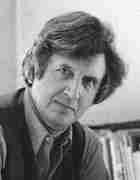Band Of Everybody Poem by Jared Carter
Band Of Everybody
In a recent Playbill biography, the actor Roy Dotrice said his "greatest accomplishment" was "bringing baseball to the Royal Shakespeare Company." In 1959 he headed a squad that included Paul Robeson at first base, Sam Wanamaker at second, Laurence Olivier at third and Peter O'Toole at short. Albert Finney was catcher, Charles Laughton was the ump, and Mr. Dotrice pitched. "I threw a mean curve, " he said. - New York Times, March 10,2000.
Let us keep this in perspective, but let us not
take anything away from it - the moment,
the afternoon, that spins away from us now,
already in another century, and far behind us,
like some distant nova gone dim.
This is a time
when Ike gets in a good eighteen holes a day,
and Tricky Dick and JFK stand waiting in the wings.
It is the year Fidel and his revolutionary comrades
enter Havana in triumph, Khrushchev pounds his shoe
at the UN, and Albert Camus's Citroën smacks a tree.
Three years earlier, Joe McCarthy has already drunk
himself to death. Three years later, Marilyn Monroe
is found down in her apartment.
Five years earlier,
Alan Turing, hounded by the police, takes cyanide.
And before that, the Rosenbergs. And tests
of the hydrogen bomb in the Pacific.
In 1958,
Hoover and the Feds pull Robeson's passport.
He has been blacklisted for years. He chooses
to go abroad, never to return to his own country.
In 1959, in London, with the Royal Shakespeare,
he stars in Othello.
Today, it is tempting to judge,
to condemn, to insist that those were the dark ages,
that the Fifties was "a low, mean decade" - all that
injustice, those grim executions, the self-loathing.
But I was there, friend.
I lived through those years.
They were no worse than any other - and no worse
than the time we live in now. The difference?
We claim we know the wrongs committed then;
we're more enlightened now. Problems remain,
of course, but in the new millennium, we're clearly
more on top of things.
But let us go back to that game,
and those actors, who needed a break, that spring day
when they scared up some bats and balls and gloves
and went out into the park. When the Yanks showed
the Limeys how the game was played, and everybody
got into it, and the wardrobe people and the ushers
came with them and made up the opposing team,
along with a few GIs who happened to be passing by.
Their girlfriends played, total strangers had a turn
at bat, and Vivien Leigh was there to cheer them on
and give the victory sign.
So for a couple of hours
their problems and their differences melted away.
Dotrice threw his wicked curve, O'Toole made
diving catches, and Laughton glowered menacingly
each time they argued with his calls.
And Robeson,
who had come so far to be there, on that afternoon,
who had seen and done so many things, known
so many people, stood up for so many causes,
served as a beacon for humans of every color,
every nationality and belief -
who in his prime
had been an all-American halfback at Rutgers,
and had dominated the gridirons of the East Coast -
Robeson could no longer run.
His knees were gone.
So they put him at first base, where he caught
every throw, and in the last inning came to the plate
with the score tied, two out, and Finney on third
with the winning run.
Robeson watched two strikes
go by, then hit a towering fly ball that went on
forever, up above the trees -
Finney tagged up
and scored, and the game was over. The actors
rushed out and tried to lift Finney and Robeson
to their shoulders, and could not, and fell down
in one great heap, rejoicing.
All that was long ago,
and almost forgotten now. But not quite.
Even
during strange days, even in the worst of times,
there must always be those who do not give in,
who go out to seek the light, to reclaim the earth
and the trees and the green meadow, as their own -
as Paul Robeson was there, on that day, to celebrate,
to share in our common humanity -
and to declaim
the words to the old songs, the old plays, insisting
that art speaks for us all - We few, we happy few,
we band of brothers.
And, oh yes, sisters, too,
Robeson would have been the first to speak up
for that critical emendation: Band of everybody.
First published in The Vincent Brothers Review.
This poem has not been translated into any other language yet.
I would like to translate this poem